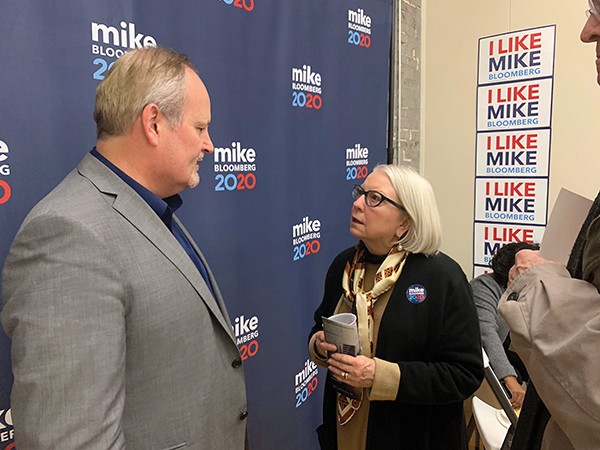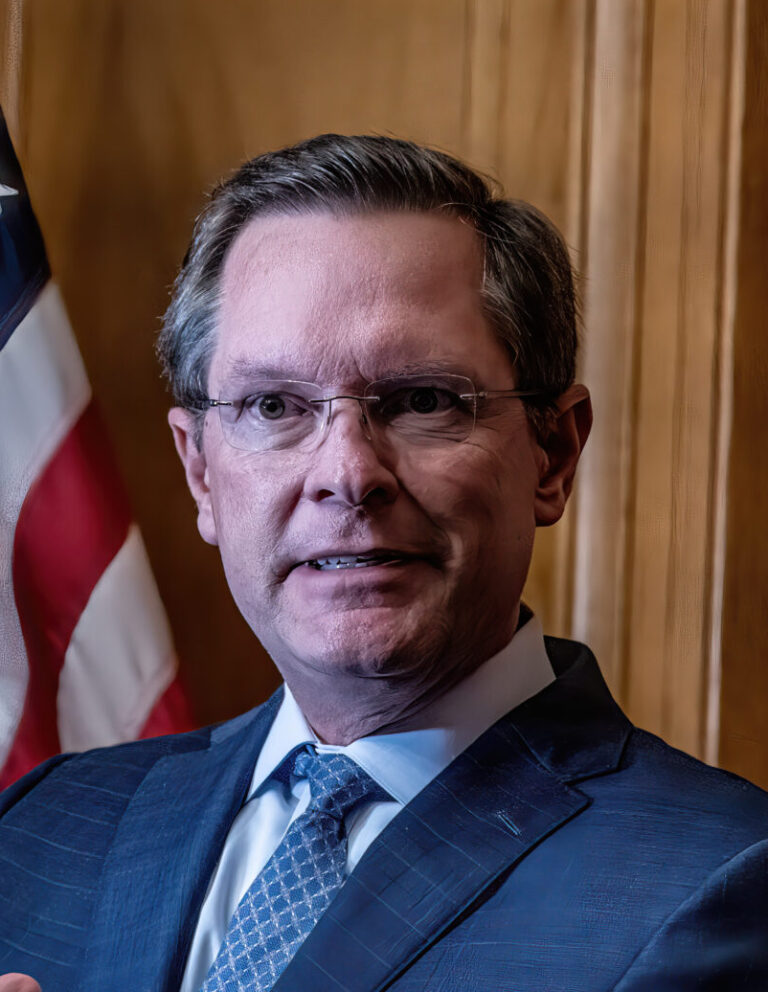This commentary is written on the cusp of the South Carolina primary and will likely be read in the immediate wake of that important test — first in the South — of Democratic presidential candidates.
Next week — March 3rd — comes Super Tuesday voting. As of this writing, four candidates were dominating local and national attention. The Killer Bs, call ’em: Bernie Sanders, Joe Biden, Mike Bloomberg, Pete Buttigieg. Still actively contending were Elizabeth Warren and Amy Klobuchar. And, though her major accomplishment thus far was to have been accused of being a “Russian asset” by Hillary Clinton, Tulsi Gabbard was still in the race, as well as Tom Steyer.
All of the aforementioned have had their moments. Biden, the somewhat folksy figure who served in the U.S. Senate for 36 years and eight years as Barack Obama’s vice president, entered the race in April 2019 as the presumed Democratic frontrunner and maintained that position, more or less, though with declining poll ratings, all the way up to the first competitive test, that of the Iowa caucuses earlier this month. A fifth-place showing there, followed by a fourth-place finish in the New Hampshire primary, a week later, took the ex-Veep to the edge of elimination, but his presumed strength among African-American voters gave him real hopes of a Carolina turnaround.

Bloomberg quartet — State Rep. London Lamar, Mayor Jim Strickland, Karen Weaver of Flint, Michigan, and Harold Ford Sr.
Biden has the distinction, if that is the right word, of having been the object of GOP President Donald J. Trump’s efforts to besmirch his name, and that of his son Hunter, in relation to the latter’s involvement as a highly paid board member of a dubiously provenanced energy company in Ukraine. It is hard to estimate the effect, for better or for ill, of all that on Joe Biden’s political fortunes, especially in light of the candidate’s disinclination to comment on the subject.
That reluctance is one of the many factors that make it difficult to assess the residual chi of the 77-year-old Biden, who in the judgment of many observers has measurably slowed down from his peak. He remains a respected figure, however, particularly among post-45-year-olds, and, as mentioned, a beloved one among African Americans, with whom he consistently polled higher than now-departed black candidates Cory Booker and Kamala Harris.
In Memphis, Biden, a bona fide moderate on such matters as national health-care policy, has been backed by such figures as Shelby County Mayor Lee Harris and influential state Senator Raumesh Akbari, and no doubt can reckon with similar kinds of establishment Democratic support elsewhere on the Super Tuesday spectrum. He will need it to continue competing with the now-surging Bernie Sanders and the big-spending newcomer Mike Bloomberg.
Harris, for one, is undeterred by Biden’s slow start in earlier states. Said the county mayor: “I believe Joe Biden is that candidate that can appeal to us — we’re all the audience — from sea to shining sea, all across America. Joe Biden is the candidate that can take a message and convert people to supporters. And he has the experience that matters. … So he’s been put on the back foot a little bit here right now. But his personal story will, if you take a moment to look at it, reveal to you that he has been able to overcome tremendous personal and professional adversity.”
Akbari also was emphatic, noting that “when it comes to the general [election], unfortunately, we in Tennessee are a deep shade of red, but we can help select the nominee who’s going to take us across the finish line in November and kick the surface and get the swamp — the real swamp — out of the White House.”

Bloomberg rep Tim O’Brien with Paula Barnes at a Memphis event
So what to make of the unprecedented financial largesse and sudden prominence in Democratic presidential ranks of former New York Mayor Mike Bloomberg? Until his declaration of candidacy in late November, his political affiliation remained obscure, inasmuch as he had passed through a lengthy stage of his life as a Republican, though a liberal one of the sort today’s GOP is unused to.
Bloomberg’s presence among his fellow Democratic contenders is seemingly as unwelcome to them as it is welcome to the party’s somewhat desperate movers and shakers. In that sense, he resembles his fellow New Yorker, Donald Trump, the political interloper who in 2015 and 2016 endured a lengthy ostracism in the Republican Party’s official battle royales until, at length, he became the Odd Man In.
To understate the case, Bloomberg has yet to demonstrate any facility at debate, but if he can somehow survive the public hostility of his Democratic competitors, alarmed as they are at his apparent determination to spend his way into the nomination, he may well end up in the good graces of the party rank and file. He is, after all, not as distant from his adopted party’s historic and contemporary goals as his rivals would claim.
His credentials on such matters as climate change and gun safety laws are, by the standards of centrist Democrats at large, impeccable. Like Biden and all other Democratic candidates save Sanders and Warren, he stands for an enhanced version of Barack Obama’s Affordable Care Act. And those who would doubt his ability to blur any disjunction between his own comfortable circumstances and the have-nots of the party he aspires to lead may have forgotten the history of a Hyde Park gentleman and New Deal champion named Franklin Delano Roosevelt.
And, where his own personal history stands in the way of acceptance, Bloomberg has demonstrated a willingness to apologize, even profusely, as he has in the matter of the stop-and-frisk police tactics he pursued as a big-city mayor.

Preparing to hear surrogate speakers for presidential candidates at Latino Memphis
Moreover, to Democratic establishmentarians, any lingering heterodoxies on Bloomberg’s part do not disqualify him as an antidote to Bernie Sanders’ unabashed leftism.
Heading up a lengthy parade of local dignitaries at a recent pro-Bloomberg rally, Memphis Mayor Jim Strickland recited a list of Bloomberg’s mayoral accomplishments: “… extraordinarily successful at business. Created it from the ground up and now has 20,000 employees. Very successful mayor of New York for 12 years. He helped create 500,000 new jobs in New York City. He reduced the number of uninsured in New York by 40 percent. He increased graduation rates, reduced crime by 45 percent and murder by 50 percent. … Mike gets things done.”
The mayor added: “Nationally, it appears to me this race for the Democratic nomination is between Senator Sanders and Michael.”
Strickland then introduced former Congressman Harold Ford Sr., whom he described as “extraordinarily special in the history of Memphis, Tennessee,” and who hosted the Bloomberg affair at his Serenity Events Center on Sycamore View.
Ford, the legendary one-time political power broker, began by acknowledging his long absence from local politics and then touted Bloomberg: “He’s got the ability to lead the country. And if you look at some of the issues that he runs with, he’s not afraid of the NRA. He’s not afraid of speaking up. He’s not afraid to represent the American people. He’s not afraid of African Americans, of Hispanics. He’s not afraid. I think he will do extremely well.”
State Representative Antonio Parkinson said, a la taking the fight to Trump, “The way that you stop the bully is to whup the bully. Right? And I believe that Mike Bloomberg is here to whup the bully.”
Thereafter a veritable parade of local political figures gave voice to their confidence in Bloomberg’s electability, as did Karen Weaver, the former Mayor of Flint Michigan, who testified to Bloomberg’s aid to her afflicted city during its ordeal with polluted water.
No doubt about it: If he can survive the first wave of opposition from his rivals for the nomination, Bloomberg has lots of backup. And lots and lots of resources.
It remains to be seen how the Bloomberg boom will be affected by the combined blows of a dismal performance by the former New York mayor in his first intramural debate (coupled with threats of more to come from the likes of Elizabeth Warren) and the runaway momentum established by Bernie Sanders in Nevada. The chief motive for a Bloomberg candidacy among many local Democrats is the expressed fear that a Sanders nomination would result in a party debacle during the general election, in the same way that progressive candidate George McGovern’s proved to be in 1972.
There are, however, flaws in this analogy. The GOP candidate of 1972 — Richard Nixon, in search of re-election — at least went through the motions of being a unifier and traditionalist, featuring as one of his prime spokespersons former Texas Governor John Connally, who was wounded in Dallas along with Democratic martyr John F. Kennedy.
And, unlike Sanders, McGovern belatedly filled the vacuum left by the flopped campaign of early favorite Edmund Muskie, who won the first contested votes before faltering. McGovern had not been vetted to anything like the degree of Bernie Sanders, who was front and center in the national consciousness for the entirety of the campaign year 2016 and through all of the intervening years since.
Claims that “Bernie cannot win” have to be measured against an impressive record of outright wins and positive polling outcomes (including hypothetical matches against Trump) during that time. His following, both locally and nationally, is passionate, committed, and formidable.
Even so, there are Democrats who believe that Sanders’ prospects, as well as those of down-ballot Democrats running with him, would be doomed by the candidate’s self-professed label of “democratic socialist.” The assumption would seem to be that the word “socialist” is still loaded with the bad mojo of the Cold War era, in which totalitarian regimes appropriated the term, as in “Union of Soviet Socialist Republics.”
Somehow, the word “Republic” doesn’t inspire the same semantic fears. In any case, Sanders — like the similarly themed Elizabeth Warren — is much more in line, policy-wise, with the safety-net societies of Western Europe and the capitalistic Asian rim, where, as he insistently proclaims, the kind of universal health care he proposes, as one example, is taken for granted.
Nor should Elizabeth Warren be counted out, at least for second place on the ticket or better than that if, peradventure, circumstances should change drastically. The Massachusetts senator has staying power and, as she demonstrated as Bloomberg-basher-in-chief at the recent Nevada debate, can re-materialize into potential viability without warning. Though Warren has declined in the polls since her zenith moments of the summer, her political profile is similar enough to that of the ascendant Sanders to warrant a second look from progressives if Bernie should stumble as old sound bites of his are politically exploited.
And, of course, she is a woman in an era in which women loom ever larger in elective politics, both in numbers and effort and as a matter of practicality. No few observers have pointed out, admiringly, that Warren has thought out detailed proposals to address virtually every public issue. “I have a plan for that” is a watchword of hers, and it should not be forgotten that her past successes include the creation of the Consumer Financial Protection Bureau. If at first blush she suggests a schoolmarm, she has the grit and gravity to far transcend the role of mere pedagogue and to rank among the major candidates.
Like those other semi-finalists, Warren has influential local support. A major backer is well-known activist and erstwhile mayoral candidate Tami Sawyer, who is lending her Midtown dwelling as a canvassing center for Warren supporters this week. As it happened, Sawyer planned to be out of town — in South Carolina, working on Warren’s behalf in that state’s pivotal primary — but her place was scheduled to be filled by no less than actress Ashley Judd, headliner for a pair of local meet-and-greets on Wednesday.
“She is suggesting some hard policy changes that speak to black and brown people,” says Sawyer, whose first choice had been former HUD Secretary Julian Castro, now inactive as a candidate but one who, Sawyer says, “spoke to black and brown people.” As for Warren, “She’s kind of unapologetic, kind of like me in that way.”
As an example of the candidate’s exactitude, Sawyer noted the senator’s proposal this week to decriminalize marijuana, pointing out that Warren expended more care than her presidential rivals on the details of restitution for the victims of harsh prior prosecution.
Sawyer professed to be unsurprised by the sudden burst of support from the local Democratic establishment for Bloomberg, whose policies as New York mayor she reckoned as having been “devastating” for minorities. And, in advance of the South Carolina results, she saw Warren as able to hold her own with Biden and Sanders.
Pete Buttigieg is the epitome of the Elephant in the Room, in that pundits hesitate to mention the issue that may be most germane to his success or failure in the presidential sweepstakes. No, it’s not the matter of his having fundraisers in upscale wine caves. Nor, to get closer to the point, is it his sexual orientation.
It’s not that he is openly gay. We are surely at the point as a society of not begrudging such a fact of identity in relation to our public icons. The list of admired gay exemplars, in the arts especially and increasingly elsewhere, is lengthy. The real issue, and it’s not easy to discuss (or to find somebody willing to discuss other than privately) is the degree to which voters — above all, African-American voters, many of whom tend to be religious traditionalists — will accept the fact of a same-sex husband fulfilling the ceremonial role of First Spouse.
There is only one way to find out, and we may have begun to in the vote totals (unknown as of this writing) from the largely black electorate of South Carolina Democrats. The answer hinges upon a first-class irony — that the fact of Mayor Pete’s evidently faithful monogamy, the one practice of his most likely to resonate with the nation’s residual social conservatism, is also the one trait that potentially constitutes an ultimate barrier to his political success.
In one sense, we need to find out which feeling predominates in America, which is legally and, dare we say, morally committed to the eradication of an historically formidable taboo.
Irony Number Two is that the need to resolve this dilemma may be the best case for putting Mayor Pete — who has risked his life for his country on the battlefield and, in debate, presents as lucidly and convincingly as any candidate in memory — on the national ballot. Meanwhile, the literal-minded classification of Buttigieg as yet another “moderate” among many, as if that were the end of it, is simply disingenuous.
It should be added that all the major candidates have their local supporters, as does the plucky Senator Amy Klobuchar, who is represented in Shelby County by the redoubtable Liz Rincon.
Super Tuesday Fun Facts
• Voting for a Democratic presidential candidate is scheduled in 14 states and two territories on March 3rd. (President Donald J. Trump is unopposed on most state ballots.)
• The total number of Democratic delegates to be won on Tuesday is 1,588. To win the nomination at the Democratic national convention in July in Milwaukee, 1,991 delegates on first ballot, or 2,376 after that will be needed.
• Tennessee’s share is 73 delegates, which, like those from other states, will for the Democratic convention be assigned proportionately to candidates’ vote outcomes.
• There are 16 choices for the Democratic presidential primary — 15 candidates, most of whom are now inactive, and one choice for “uncommitted” delegates.
• There are choices for local offices as well on both a Republican and a Democratic ballot. (See “Politics” at memphisflyer.com for coverage of these.) Voters must choose which ballot they prefer.
A P.S. on Bernie: I spent most of last weekend being analytical online about the various candidates vying for the Democratic presidential nomination. And with minimal changes these posts ended up as components in this week’s Memphis Flyer cover story, “Super Tuesday Countdown,” a preview of next week’s round of primaries in a number of key states, including Tennessee..
The implicit thrust of all the profiles and all the analyses was that the obvious pace-setter in the Democratic field was Bernie Sanders, the progressive Senator from Vermont and the undisputed head of a burgeoning and, it would seem, ever-growing political movement.
Uniquely among the candidates, he commands an unflagging loyalty that is both personal and ideological in nature. And he is correct that the reforms he proposes — among them, single-payer universal health care, free post-secondary education, and aggressive government attention to climate change — are hardly as “radical” as his opponents proclaim. They are, in fact, the norm or are on their way to becoming so in the rest of the civilized world.
The Democratic rival closest to him, policy-wise, is Senator Elizabeth Warren, but she is in significant error when she calls herself a “capitalist.” We don’t have to be Marxists to recognize that such a term describes those who own the means of production and, one way or another, are financial speculators. The Massachusetts Senator is not even a businessperson, but a working stiff like the rest of us.
In his economic rationales, as well as his policy prescriptions, Bernie sees things from the point of view of working people, and the response to him so far, in polls as well as in actual voting, indicates that he is tapping a legitimately aggrieved mood in the country and is doing so, not a la Trump, by what so many critics see as sheer demagoguery, but via appeals to the actual self[-interests of the have-nots, not just their emotional resentments.
We are by now used to hearing people, not just Republicans or convinced conservatives, but certain kinds of professed Democrats, profess to be “scared” of the notion of Bernie Sanders as either candidate or President. Not to worry, I would counsel. Who among us is frightened of the idea of truth-telling (an apt description of someone who would admit the simple fact that Cubans gained in literacy under Fidel Castro)? And is the idea of universal health care really all that scary?
But batten down such doors as thou wouldst. It’s still a free country. But there is a reason why more Democrats (thus far) have responded to Bernie than to any of his opponents. As, for that matter, there had to be a reason why, in 2016, more Republican primary voters opted for Trump over his GOP rivals.
I add this note as a brief postscript to my cover story in the Flyer’s October 27 print edition because, though I unmistakably credited Sanders with being the Democratic front-runner in that article, I did not spell out his candidacy to the same degree as some of the other Democrats. Consider this a remediation of sorts.
Someone, once upon a time, called for there being “a choice, not an echo.” We can all agree, surely, that a race between Bernie Sanders and Donald Trump would, if nothing else, provide that.






 Jackson Baker
Jackson Baker  Jackson Baker
Jackson Baker  Jackson Baker
Jackson Baker  Jackson Baker
Jackson Baker  Jackson Baker
Jackson Baker  Jackson Baker
Jackson Baker  Jackson Baker
Jackson Baker 

